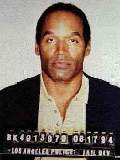
Burden of Proof
By Gary P. Posner
(© 1995)
|
This site's URLs are case sensitive (GoDaddy hosts it on a Linux server). Not optimized for mobile devices (may display formatting irregularities). |

Burden of Proof
By Gary P. Posner
(© 1995)
As "skeptics" of the paranormal and fringe sciences, we are accustomed to placing the burden of
proof upon the proponents of improbable-sounding claims. Given the "mountain of evidence"
against Simpson, many find allegations of UFO abductions less improbable than the notion that
someone other than O.J. committed those murders. But Simpson is now free to roam the golf course
like an innocent man, while our science books remain devoid of chapters on ET visitations.
What is good for the goose is obviously not necessarily good for the gander. In
the courtroom,
"I was sleeping, or I was chipping golf balls, or I was packing for my trip" is considered an
alibi to be afforded the benefit of the doubt. Just as juries in malpractice suits are holding
doctors to a standard of perfection, prosecutors now increasingly need a "perfect" case, or a
defendant without the means to buy a "dream team," in order to get a murderer off the streets.
But in the scientific arena, assuming the validity of an improbable claim, until proven
otherwise, would require that textbooks and curricula be updated upon publication of each issue
of the Weekly World News.
Our "system of justice" was designed with a noble purpose. As they say, it is preferable that
100 criminals go free than one innocent person be wrongly convicted. This system is praised as
the best in the world, although the competition may not be terribly keen. And in the 1700s, it
probably served us well. But with untold thousands of groups of "100 criminals" now roaming
free, those citizens so far unscathed by serious crime are becoming an endangered species.
One also wonders how so many "eminent" persons of the law can seemingly have so little compunction
about proclaiming before the TV cameras inside the courtroom that their criminal client is an
innocent victim. Legal ethics (increasingly an oxymoron) supposedly preclude such bald-faced
lies. But at least, after spending the day
pleading to the jury for "justice," some let their hair down enough to look into the TV cameras
outside the courtroom and admit that "We're not after justice, we're out to win."
Such attorneys, exibiting a willingness to do anything (if the money is right) to get
their client off, might be thought of as the "Kreskinites" of the legal profession. Like
Kreskin --
a magician who leads his audiences to believe that he
possesses genuinely mysterious powers -- these lawyers revel in the use of misdirection and other
nefarious techniques designed to obfuscate.
What if the scientific community were to adopt the lofty standards of our "system of justice"?
In this age of political correctness, why shouldn't they? -- it's only fair. Let's begin giving
the benefit of the doubt to those sincere-sounding UFO abductees, whose testimony is uncontested
by witnesses to the contrary. As UFO proponents have so correctly pointed out in the past, the
evidence in their favor would certainly prevail in any court of law. Even Carl Sagan agrees that
our dry, uninspiring science textbooks need overhauling. Why not fill them with tales of UFO
abduction, ESP, astrology, pyramid power, Bigfoot, and the unabridged teachings of
Ramtha? Maybe
our youth would then find their science homework to be as relevant to their lives as is MTV.
Then, if it works for science, we can do the same for history. [Late update:
TV's so-called "History" and "Science" Channels have certainly taken my advice!]
Or perhaps our "justice" system might consider taking a few small strides toward emulating the
scientific approach to determining truth. Not that any of us would wish for even one innocent
person to be wrongly convicted of a crime. But maybe we could settle for only 99 criminals going
free
In the opinion of many, a paranormal event of sorts occurred on October 2, when a
jury of twelve took but a handful of hours to unanimously decide that O.J. Simpson was "not guilty" of
the murders of his ex-wife and her friend -- at least not guilty "under the law." In the
opinion of the jurors (assuming they based their verdict on the evidence and the
law), the prosecution had failed to prove one or more of the essential elements of its
case beyond a "reasonable" doubt.
|
|
|
|
|
|
|
|